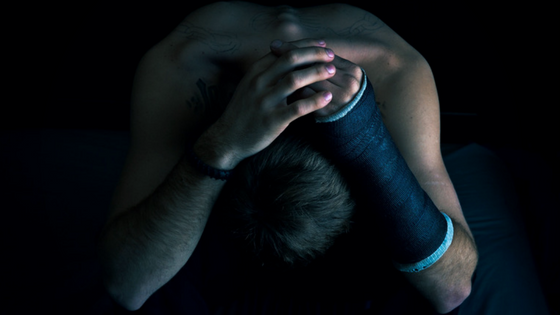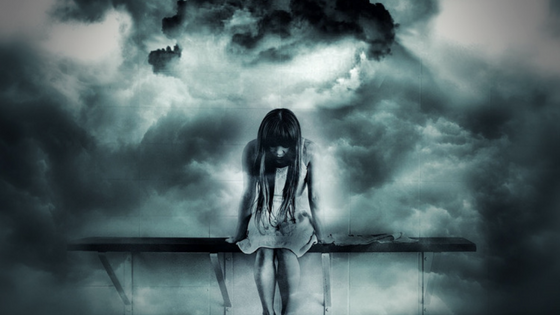Depression. We’ve all heard of it. We all think we know what it is. But do we?
Depression isn’t just about feeling down, nor is it about what goes on in our heads, but what happens in our bodies, too.
Studies show that as many as 1 in 4 of us will experience a mental health problem at some point in our lives. That means you know someone—probably several someones—with depression, anxiety, an eating disorder or something else. It’s therefore important that when we write about these things we do so accurately, sensitively, and honestly.
I’ve written in the past how to write about psychopathy, sociopathy, and panic attacks. Now it’s time to find out more about depression, and how to write about it…
Things to know about depression before you start
There are different kinds
This is imperative to remember before we begin. Different types of depression can manifest differently and be triggered by different things. Some examples are:
- Reactive depression
- Clinical depression
- Bipolar disorder (used to be known as manic depression)
- Major depressive disorder
- SADs
- Post natal depression
- Prenatal depression
- Dysthymia
This is a general guide. The symptoms vary in extremity depending on the type of depression the person experiences.
Treatments vary
If you want therapy in the UK, chances are you’ll have to go private. Being offered anything other than pills on the NHS makes you VERY lucky right now. Pills are a short-term fix, but they’re cheaper than therapy.
There are many types of antidepressants, but some of the most common are citalopram and sertraline. Side effects can include fatigue and diarrhoea.
If you go down the therapy route, you’ll either speak to a counsellor, psychologist, or psychiatrist. The latter is the only one that can prescribe pills.
Cognitive behavioural therapy is seen as the best way of treating depression.
Triggers can be big or small
A death of a loved one can trigger depression as can losing your job. However, so can a build up of smaller, seemingly inconsequential things.
Mental health is a tricky thing. It’s not all black and white, no matter how much we may want it to be.
It’s linked to other disorders
Depression is linked to many other mental health problems, most commonly anxiety and eating disorders. It can also tie in with physical health problems like fibromyalgia.
It has physical side effects, too
The longer depression goes on, the more likely it is to be tied to physical pain. Yes, pain. Pain that makes you think you’ve pulled a muscle, or have a brain tumour, or are dying. Pain that your oversensitive mind jumps to conclusions about.
It can also manifest as aching all over the body; like your body is made of lead and standing takes all of your energy.
You’re not always suicidal
Most people assume those that are depressed are suicidal. That’s not always the case. You can feel down and hate yourself but not want to take your own life. You can still strive to be better and to be fixed, just not know which direction to turn in. You may even be scared to take your own life, or worry how those that depend on you would cope without you. That makes you hate yourself more, doubt yourself more, and feel like even more of a failure.

Psychological Symptoms
Feeling down
This one is obvious, and the most well-known. It’s not a case of feeling upset that your favourite TV show has finished for the summer, though. This is crippling: it stops you from functioning. It must last for a prolonged period of time (usually a few months) to be labelled as depression.
Self Doubt
Doubting yourself is a horrible thing, but it’s a key part of depression.
Being cranky
Depression isn’t just about being down. Your mood can also be ratty and unsociable. You may become misanthropic. People will bore/irritate you. You’d rather be at home in bed, or watching TV. Anything but deal with people.
Isolation
Depression makes you feel alone. It doesn’t matter how many people are around you. It tells you that you’re alone. There’s no way out. No one cares. You’re worthless. Why talk to anyone? They won’t listen. It’s a constant cycle of self-hatred and self-doubt that causes you to isolate yourself, but may also cause others to isolate themselves from you because they don’t know how to handle your moods.
Guilt
Even if something isn’t your fault, you may feel plagued by guilt.
Lack of motivation
When you’re low on energy it’s easy to feel demotivated. Put that on top of self-doubt and you begin to wonder what the point in doing anything is, even things you used to love. Why write a book if nobody’s going to read it? Why go out with friends when none of them like you? Why get out of bed when the day will suck anyway?
Lack of enjoyment
When you feel down all the time, it’s difficult to enjoy even your favourite things. You may find some things comforting, but they won’t fill you with glee like they once did. It’s like being stuck underneath a glass ceiling, with all the positive emotions trapped above it: you know they exist, but you can’t reach them.
Loss of libido
It makes sense that if you have no energy, interest in doing things, and struggle to enjoy things that you’re not interested in sex, either. It’s nothing personal against those you have—or don’t have—sex with, but it just doesn’t appeal to you anymore.
Poor performance at work
This ties in with the lack of motivation: you lack the desire and energy to do anything, so it rubs off on other aspects of your life, and work is no exception.

Physical Symptoms
Lack of energy
Depression saps your energy. It turns you into a zombie, making you question what’s physically wrong with you when actually, it’s all tied to your depression.
Constipation
It’s amazing the impact mental health problems can have on your digestive system.
Messed up menstrual cycle
When your body is out of sorts, so is your menstrual cycle.
Changes in weight or appetite
Some people eat more when they’re depressed, others eat less. It varies from person to person. It may only be a subtle change that close friends pick up on, but it will be there. Some find solace in food: there’s a reason it’s called ‘comfort food’. Others punish themselves by not eating: why do something they enjoy if they don’t deserve it? Or they don’t want to eat because they feel nauseous, or they lack the energy to make and prepare food so don’t bother.
Disturbed sleep
When you can’t switch off and your mind is filled with doubt, it’s inevitable that sleep will be affected. It can be trouble falling asleep, trouble staying asleep, or trouble waking up.
Sleeping a lot without feeling refreshed
Sleep is how our body recovers, but if we’re not sleeping properly we’re going to feel drained. When your brain and body can’t switch off properly you can’t recharge properly, so when you wake up you’re not going to feel refreshed. You may need more sleep than usual, or wake up after twelve hours of sleep and still feel drained.
Speaking more slowly than usual
When you lack energy and confidence, you have less conviction in what you’re saying. Words come out mumbled, possibly inaudible. You may not even realise you’re doing it, but those around you will ask you to repeat yourself or accuse you of mumbling because they don’t understand what you’re saying.
Conclusion
Depression is a complicated thing to write about, but just like it’s important for us to represent people from different races and cultures, it’s important for us to represent people with different mental and physical illnesses too. Not only does this make those that suffer from such things feel less ‘other’, but it also allows those that haven’t been through the same thing to empathise with those from other situations to them.
Sources and further reading

If you found this post useful…
I’ve also written guides on:










Fortunately – or not – I had it: depression, with a bout of agoraphobia, when I lost four beloved people in a few years; my mother’s death being the worst. It happened in my menopause years (linked in my opinion). BUT I said ‘fortunately’ (though not at the time!!) because it made me a better person and I can fully appreciate what others are experiencing and am now empathetic Being a writer, the knowledge helps in pertinent circumstances…Maybe I was unlucky at the time, but one doctor and a psychiatrist made me feel like a young child and were totally rude and unhelpful. However my older, usual doctor was wiser and a better example of how doctors should behave, bless him. Everyone who says “Pull yourself together!” should have depression for 24 hours. No argument!!
i have depression and im only 12 in the 7th grade and i thank about death a lot and im typing a story on it and this helps alot thanks
I would also like to add, feeling numb. It can cause you to feel detached at times.
I have had manic-depression for over thirty years. At times I have what is called hyper rapid cycling of mood changes, I shift from severe hyper mania to suicidal or severe depression quickly. These can go on all day. It feels like I’m walking threw hell soaked in gasoline. I am on several medicines that keep me alive. People have been awful to me because I take drugs, I am blessed to have them. I loved this article, because it gave me helpful tools for my writing and was an excellent form of educations. It was written in a loving and respectful manner. Thank you
My heart goes out to every one who made comments. You’re brave people, with whom I have respect and compassion.